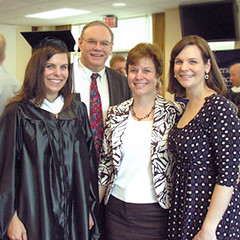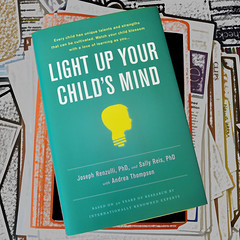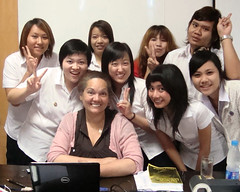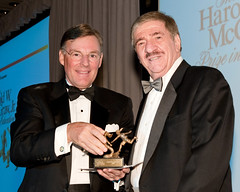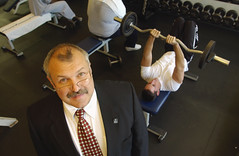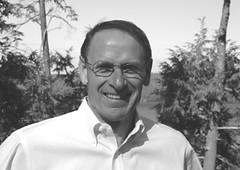
The inability to recognize even simple terms often leads to serious reading problems later, says Michael Coyne, whose research on reading interventions for kindergarteners, including intensive vocabulary training, is gaining national attention.
Coyne, an associate professor in the Neag School’s Center for Behavioral Education and Research (CBER), has won nearly $4.5 million in federal grants to study how schools can help poorly prepared kindergarten children bolster reading skills. His work comparing various methods of vocabulary instruction for kindergarteners was published in the September 2009 volume of The Elementary School Journal.
Poor reading ability, especially among disadvantaged children, remains one of the nation’s most pressing education issues. One-third of the nation’s fourth-graders cannot understand basic fourth-grade reading material, according to the U.S. Department of Education’s most recent test. In Connecticut, one out of five third-graders cannot understand basic third-grade material, statewide tests indicate. In major cities, the number is nearly half.
Reading difficulty is a major factor in the academic achievement gap that finds many low-income and minority children lagging behind their classmates.
“Kids come into school with significant differences in their experiences in language and literacy,” Coyne says. “We see differences in their vocabulary knowledge, in their ability to think about sounds in speech, in their knowledge of the alphabet.”
In his vocabulary intervention study, Coyne cites earlier research showing that disadvantaged children often enter kindergarten knowing thousands fewer word meanings than their peers. Some cannot identify common objects and do not know terms such as “top” and “bottom” or “before” and “after,” he says.
Nevertheless, his research has found that specific vocabulary instruction for young children can make a lasting difference, he says. “Kindergarten kids, even those with at-risk backgrounds, can really learn sophisticated vocabulary if we provide support for them – the kind of vocabulary that’s going to give them long-term benefits,” said Coyne, the project director of two studies examining vocabulary interventions for young children.
At the Shoreline Academy in New London, one of Neag School’s CommPACT school reform pilot sites, kindergarten teacher Jeanne McDowell says Coyne’s vocabulary intervention approach has made a difference in her classes, even among children who are learning to speak English.
“I think it’s working very well,” she says. The program has not only expanded children’s vocabulary, it has made them better learners, she adds: “Children become very conscious of words … very inquisitive about words.”
 Coyne is also co-director of a major study examining the effectiveness of a promising early reading program first developed at the University of Oregon and later published commercially. That program, known as Early Reading Intervention, is being tested in places such as North Windham School in Connecticut, one of about 25 schools in Connecticut, Texas, and Florida that are working with Coyne.
Coyne is also co-director of a major study examining the effectiveness of a promising early reading program first developed at the University of Oregon and later published commercially. That program, known as Early Reading Intervention, is being tested in places such as North Windham School in Connecticut, one of about 25 schools in Connecticut, Texas, and Florida that are working with Coyne.
“Probably the majority of our kids coming in are deficient with oral language skills,” says Betsy Fernandez, principal at North Windham, where more than half the children are Latino, and many are from low-income families.
The ERI program is designed to give struggling readers extensive, systematic training in an understanding of the alphabet and the relationship between letters and sounds.
“It’s very explicit,” says Fernandez. “It really covers the key skills that need to be taught in kindergarten.”
So far, the results are encouraging, she says. “We found that the kids do very well. They make great gains.”
George Sugai, director of UConn’s Center for Behavioral Education and Research, says Coyne’s work has been significant “because he has tested and demonstrated effective … reading techniques that can be used successfully with young readers who have been unsuccessful in traditional core or basal reading programs.”
Coyne came to UConn in 2001, but his interest in helping poor readers began years earlier. As a special education teacher in Massachusetts and New Hampshire, he worked with third-, fourth- and fifth-graders who already were unmotivated and falling behind.
“They were mostly kids with learning disabilities,” he says. “Almost all of them had reading difficulty. It seemed to be this bottleneck to having them have success in other areas.”
Coyne says he began thinking that the problem needed to receive attention earlier, one reason his research has focused on kindergarten children. He hopes to help them avoid what he calls “a trajectory of failure.”
“There’s been a real advance in our ability to identify kids who are at risk,” he says. “There’s a lot of evidence that with targeted, intensive support, kids can change those early trajectories.”
Coyne is a frequent consultant to school districts and state education departments across the nation. Last year, he received the Distinguished Early Career Research Award from the Council for Exceptional Children, a national special education advocacy group. He also won the Neag School of Education’s Outstanding Young Investigator award in 2004.
